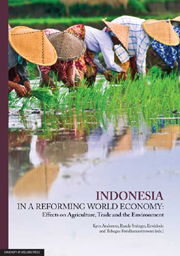Book contents
- Frontmatter
- Contents
- List of tables, figures and boxes
- FIGURES
- Acronyms
- Preface
- List of contributors
- 1 Introduction
- 2 Effects of growth, its interruption, and the Uruguay Round on Indonesian agriculture
- 3 Effects of AFTA and APEC trade policy reforms on Indonesian agriculture
- 4 Trade liberalisation and soil degradation in Indonesia
- 5 Will the Uruguay Round and APEC reforms harm air and water quality in Indonesia?
- 6 Impacts of agricultural protection growth at home and the WTO's Doha Round on Indonesian agriculture
- 7 Effects of agricultural policy reform on household and regional income distribution in Indonesia
- 8 Effects of farm policy reform on Indonesia's secondary food crops
- 9 Effects of agricultural policy reform in Indonesia on its food security and environment
- 10 Impacts of trade policy reform on income distribution and poverty in Indonesia
- APPENDIX 1 The WAYANG Model of the Indonesian economy
- APPENDIX 2 The GTAP Model and database
10 - Impacts of trade policy reform on income distribution and poverty in Indonesia
Published online by Cambridge University Press: 05 June 2012
- Frontmatter
- Contents
- List of tables, figures and boxes
- FIGURES
- Acronyms
- Preface
- List of contributors
- 1 Introduction
- 2 Effects of growth, its interruption, and the Uruguay Round on Indonesian agriculture
- 3 Effects of AFTA and APEC trade policy reforms on Indonesian agriculture
- 4 Trade liberalisation and soil degradation in Indonesia
- 5 Will the Uruguay Round and APEC reforms harm air and water quality in Indonesia?
- 6 Impacts of agricultural protection growth at home and the WTO's Doha Round on Indonesian agriculture
- 7 Effects of agricultural policy reform on household and regional income distribution in Indonesia
- 8 Effects of farm policy reform on Indonesia's secondary food crops
- 9 Effects of agricultural policy reform in Indonesia on its food security and environment
- 10 Impacts of trade policy reform on income distribution and poverty in Indonesia
- APPENDIX 1 The WAYANG Model of the Indonesian economy
- APPENDIX 2 The GTAP Model and database
Summary
Globally, markets have become much more integrated in recent years. Such integration creates enormous opportunities for the world economy, bringing vast benefits for some, but losses, and maybe even suffering, for others. The tendency among trade economists for much of the last fifty years has been to argue that trade is Pareto improving, increasing the national income of all countries engaging in trade and eventually boosting all households when there has been sufficient time for re-structuring and adjustment to the changing circumstances. However, the focus on Pareto improvement and the ‘trickle down’ effect of trade reform appears no longer sufficient to justify opening up to global markets. Rather, recent debate has seen the focus shift specifically to how poor households are affected by the opening of markets – even though we know from economic theory that trade is not the firstbest income re-distribution measure except under limiting circumstances (Corden 1997).
Whilst a number of different groups could be harmed by changing commodity and factor prices, many argue that what is happening to poor households should be of primary importance since they are most vulnerable and because the re-distributive nature of trade policy is marginalising and impoverishing poorer people relative to wealthier people in many parts of the world. There are fears that trade policies are causing price increases for basic necessities, employment losses for poor people working in contracting industries, and declining unskilled wage rates, all contributing to worsening poverty.
- Type
- Chapter
- Information
- Indonesia in a Reforming World EconomyEffects on Agriculture, Trade and the Environment, pp. 206 - 243Publisher: The University of Adelaide PressPrint publication year: 2009



